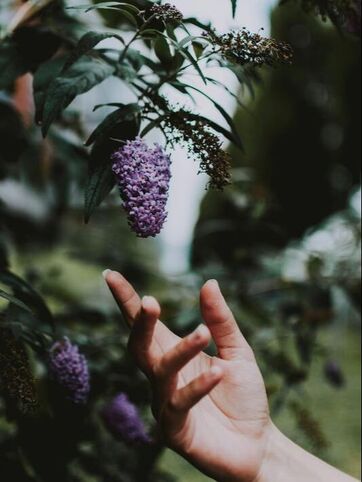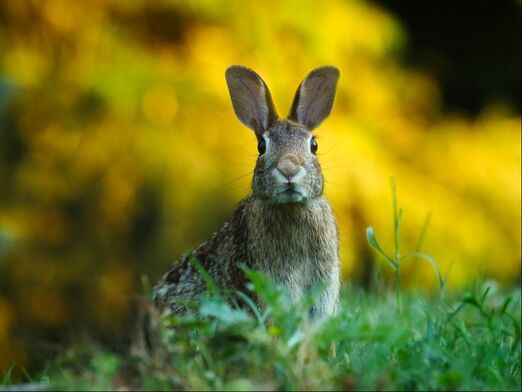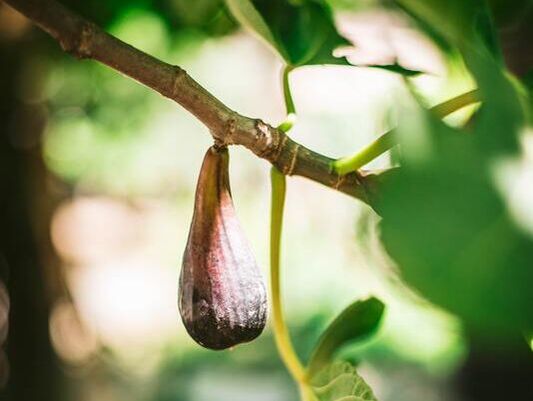|
There was once a woman who kept all her songs and stories to herself because no was willing to listen to them. All of her memories and longings remained buried deep within. After a time, her stories and songs grew restless—they wanted to be heard. They struggled to come out, but the woman could not share them. Finally, they made their way into her dreams. While she slept, she tossed and turned as the dreams roiled around inside her. She woke up, confused. “What’s the matter?” asked her husband? “I don’t know,” she replied. One morning she was so tired that after her husband left for work she lay down on the kitchen floor and fell sound asleep. Her mouth opened and she began to snore. The stories and songs escaped into the air, hovered above her, watching her sleep. “We cannot leave her like this,” they said. “What will she do without us?” The stories turned themselves into a robe and hung on a peg by the bedroom door. The songs became slippers and rested underneath. That night when her husband returned from work, he got suspicious. “Who was here while I was gone?” “No one.” “Who do those slippers and robe belong to?” “I don’t know,” she said. They argued. When night fell they were still arguing. Now in that village it is a custom that when a couple disagrees and can’t settle their disputes by the end of the day, the husband spends the night in the Temple of the Monkey King. The husband stormed out of the house and went to the temple. He lay down to sleep in one of its darkened rooms. The wife sat at the kitchen table trying to make sense of what had happened. Finally, she blew out the candle, put her head down on the table, and fell asleep. Each night, in that village, when people put out the candles, the flames go to the Temple of the Monkey King to chatter and discuss the day’s events. As the husband lay on the floor, one by one, the candle flames danced into the darkened room where he slept. They chatted, waiting for all the tongues of flames to arrive. After a while it was clear that one flame was late. “Where is it?” a flame sputtered. Finally, the last flame showed up. “Where have you been?” they wanted to know. “My couple had an argument. The husband came home and found a strange robe and slippers by the bedroom door. “Oh, he must have been angry!” the others exclaimed. “Yes,” he was, “but it isn’t what he thinks. The woman has stories to tell and songs to sing but no one ever listens. All her life she has kept them locked up inside her. This morning while she slept, they found a way to turn the stories into a robe and the songs into slippers.” The husband, wakened by the flames, heard what had happened. He immediately left the Temple of the Monkey King and ran back home. In the moonlight, he could see his wife slumped over the kitchen table. He awakened her gently, putting the robe around her shoulders and the slippers on her feet. Then, he sat down beside her, and said, “Tell me your stories. Sing me your songs. I am here. I will listen.”
0 Comments
Once upon a time there lived a man with a large head of well-cared for cattle that he regularly grazed in fine pastures and milked twice a day. But one morning, when he went to milk them, he found they’d already been milked. He found this very curious. He tried to take even better care of them, but that night, and the next morning, when he tried to milk them, their udders were wrinkled and dry. That night, he sat up in his barn to see if he could discover the cause. About midnight, he saw a cord come down from the stars, and climbing down the cord were a group of people. When he ran toward them, they ran for the cord, but a young woman with a calabash and basket remained. She so filled him with light he asked her to marry him. She agreed but said, “There is only one thing I ask of you. Never look into this basket without my permission.” He promised. For a time, all was well. They lived happily together, sharing the work. She cultivated the fields. He looked after the cattle. One day, when he returned to have a drink of water, he saw the basket and looked into it. He saw nothing. In the evening, his wife came home and after one look at him, knew he’d opened her basket. “You looked in my basket, didn’t you? Even though you promised you would not do so.” “Yes, I have,” he admitted, “and I don’t understand why you made such a fuss. The basket is empty. There’s nothing in it.” “You saw nothing in the basket?” “No. Nothing.” With great sadness she said, “If you see nothing in my basket I cannot stay.” She turned away from him and vanished, back to the stars from whence she’d come. There once lived an old couple with their young daughter. After her husband died, the widow worried about what might become of her lovely daughter when she was no longer able to take care of her. The mother told her daughter, “The world can be a cruel place to a fair and kind young woman. To protect you, I am placing a wooden bowl on your head. Wear it when you go outside. When I am no longer in this world you must always wear it. The bowl will protect you from harm.” After her mother died, the maiden put the bowl on her head and went to work in the rice fields. Many laughed at the sight of a woman with a bowl on her head; some jeered and made nasty remarks. She remembered her mother’s words and ignored the comments. Some men even tried, with no success, to take the bowl off of her head. A neighboring farmer noticed the diligence with which she worked, paying no attention to those who spoke and acted harshly. He invited her to work in his rice fields where she would be safe from those who chose to harm her. In time, he and his wife grew fond of the young woman and treated her like a daughter. One day, their eldest son returned from the city, tired of the life he’d been living. When he saw the maiden with the bowl on her head he asked his father who she was. “She is a kind young woman who works hard.” The son worked alongside her and the two became friends. He grew to love her and asked her to marry him. Although she loved him, she refused. She was a servant. A woman with a bowl on her head. That night she dreamed her mother visited her, encouraging her to follow her heart, that if she did, all would be well. The next morning, the son asked her again. This time the maiden said yes. On the day of the wedding she tried to take the bowl off of her head but it stayed fast. The son tried, but he too could not remove it, nor could anyone else. The maiden asked if he would like to change his mind about marrying her, a woman with a bowl on her head. He smiled and said, “I love you as you are. Let the wedding proceed.” After the wedding feast, as the maiden took a sip of the ceremonial wine, the bowl fell off her head and crashed to the floor. She heard her mother’s voice, saying, “Yes!” For as long as anyone could remember, the tribe cherished the statue of Golden Eagle, given to them by god Ches for their goodness and wisdom. They were told to guard it well for it had magical powers but there would come a time when they would have to give it back. For generations the god’s gift brought victory and good fortune to the tribe. Then, a ruler died leaving no sons to rule. According to their law, a daughter could become the ruler. Because the young woman was wise and kind, she was accepted by the tribe who loved her gentle ways. She had not ruled for many moons when she became ill, so ill that nothing the tribe and their healers did—making medicines, creating brews, doing sacrifices, painting their bodies, performing special dances—cured the princess. One morning, she woke early and spoke to her dearest friend and companion. “Mistafa, god Ches appeared in my sleep. He asks that Golden Eagle be returned to his temple on the mountain peak. Only then will I be well.” Mistafa told the princess it was only a dream, but the princess was clear. “I am too weak to go. You must go in my place.” Mistafa was besieged with doubts and fears. “Who am I to approach a temple only chieftains visit? How will I find the way? What if I am not strong enough to carry Golden Eagle all the way?” The princess told her, “Do not be afraid for god Ches will support and protect you. He will show you the way. When you reach the peak of the mountain bury Golden Eagle at the side of the temple. Call out to god Ches three times. He will hear you. Listen well to what he says.” Mistafa wrapped Golden Eagle in a soft cloth and began her journey. Her arms ached from carrying the sacred sculpture. Her feet ached from the miles she walked. Seeing the mountain peak gave her new strength and energy. Using a sharp rock, she dug a hole deep enough to bury Golden Eagle, then cried out to god Ches three times. All was quiet. She fell asleep nestled in the cloth in which she had carried the sacred statue made of gold. When she woke the next morning, she saw what she had not seen before. Where she had buried Golden Eagle there was now a lovely bush covered with green leaves and purple blossoms. A voice commanded. “Gather leaves in the cloth and bring them to the healers. Tell them to brew a strong tea and serve it to the princess.” Mistafa did as she was told, then made her way back without stopping to eat or drink or rest. She brought the leaves to the healers who prepared the tea. With each sip of the strong brew the princess regained her strength and ruled wisely for many years. Little Parrot loved the jungle. Every morning she would fly over the greenery, look at what lay below, and count herself fortunate to live in such a place. Only when she was sure that all was well did she fly back to earth and eat her breakfast. One morning, while flying overhead, she saw nothing but thick, dark smoke. The jungle was on fire! Little Parrot flew over to the river as fast as her small wings permitted, took a huge gulp of water, flew back to the fire, and spit out the water, trying to quench the massive flames. Back and forth she went, from the river to the fire, from the fire to the river, trying her best to put out the fire though she was very little and could only take tiny gulps each time. She soon became exhausted but kept on going. Her beloved jungle was at risk. As she was flying for the umpteenth time to the river, worried that the jungle would burn before she could put out the fire, she heard a loud laugh. Then she heard a cackling voice say, "You’re a silly parrot. You’re too little to put out such a big fire." Little Parrot looked up and saw Eagle, the largest bird in the jungle. “I don't need advice” she said. “I need help,” then continued flying to the river. The next thing Little Parrot knew, a huge stream of water poured from the skies dousing part of the fire. Little Parrot did not stop to see who was helping her, she just kept flying to the river and back, hoping that with help the fire would soon be put out. When there were no more flames, Little Parrot looked around to see if she could find the source of the help for which she was so grateful. Surprised, she saw that it was Eagle. Though she was utterly depleted, she flew up to Eagle and said, “Thank you from the bottom of my heart. Were it not for you, the fire would still be burning.” “No,” said Eagle, “it is I who must thank you.” Maui Muri noticed that no matter how hard people worked they never had enough daylight to finish their tasks. The Sun-God, Ra, moved too quickly across the sky. He decided he needed to find a way to make Ra move more slowly. Maui Muri and his brothers made a tough rope out of coconut fibers. Then, Maui Muri lay in wait for Ra. When he saw Ra, he threw the rope around Ra but the rope broke and Ra flew across the sky as quickly as ever. Maui Muri made a second, stronger cord out of coconut husks which he braided into an even stronger rope, but for the second time, Ra escaped. After much thought, Maui Muri asked his sister Hina to give him some of her hair. He cut off long strands and braided them into a very strong rope. When Ra appeared, Maui Muri threw the noose around Ra’s neck and held tight. When Ra realized there could be no escape, he asked Maui Muri what he wanted. “You must move more slowly across the sky so we have more time to do our work. Promise me this and I will let you go.” Ra promised, but just to make sure he kept his word, Maui Muri left a few strands of Hina’s hair hanging from the sun. You can still see them when the sun is going down and the last rays of light fill the sky. *Maui Muri is a trickster figure commonly found in Polynesian mythology One day, when Rabbit returned home, he noticed strange tracks in front of the door to where he lived. He shouted, “Who’s in my house?” A loud voice roared back, “I am all powerful. I eat elephants for breakfast. I turn rhinoceroses into dust. I am invincible.” Terrified, Rabbit ran away. What could a small animal like himself do against one who was so powerful? As he ran, he saw Jackal, who agreed to go to Rabbit’s house to help him get rid of the mighty creature. Jackal called out, “Who’s in Rabbit’s House?” The loud voice roared back. “I am all powerful. I eat elephants for breakfast. I turn rhinoceroses into dust. I am invincible.” Jackal turned and left, saying he could do nothing against one so formidable. Rabbit continued asking bigger, stronger animals to help. But after hearing the fearsome words of the powerful stranger, Leopard said he had a toothache. Tiger said he had a prior appointment. Lion said he was too busy. Privately, they all admitted that whoever was in Rabbit’s house was too fierce for them. Discouraged, Rabbit met Frog and told him of his troubles. Frog agreed to see what he could do. When they reached Rabbit’s house, Frog shouted, “Who is here in Rabbit’s house?” The voice roared, “I am all powerful. I eat elephants for breakfast. I turn rhinoceroses into dust. I am invincible.” Frog gulped. Took a deep breath. Shouted back. “I am the strongest of all living creatures. I leap over mountains. I fly over rivers. I fear no one. Whosoever arouses my wrath will live to regret it.” Suddenly, out crawled Caterpillar. “Please, don’t hurt me. I’m only a tiny caterpillar.” When Frog and Rabbit saw Caterpillar shaking with fear, they all had a good laugh at the trick Caterpillar had played. Ngāti Awa chief, Te Keepa Toihau, had a daughter, Mereaira. She married a young Whakatõhea chief, known as Kape Tautini who came from the Õhakana Island. Even though Kape Tautini’s people were known to be enemies of the Ngāti Awa, the couple lived happily with her father. In time, a child was born. After a while, Kape Tautini became restless among his wife’s people. He longed to be with his own people. One night, without letting anyone know he was leaving, he made his way back to his Whakatõhea people. Mereaira missed her husband. Each day she grew sadder and more unhappy. She worried. Questioning why he had gone. Fearful of what might happen. Not long after he left, a fleet of Whakatõhea war canoes was seen approaching with Kape Tautini leading the way. Mereaira and her people were unprepared for an attack and grew more afraid as the warriors shouted their grievances of past insults and wounds. Filled with love and dread, Mereaira was determined to do what she could to prevent a war. Before the warriors had a chance to begin their assault she ran to edge of the cliff and stood there, holding her baby above her head. She cried out. “This child I hold is born of the marriage between our two peoples. Why create a child if the price is continuing bloodshed? Why not choose peace?” She held the baby out in front of her. “If this violence does not end, I will throw my child against the rocks. His life is in your hands. His death will haunt you forever.” Kape Tautini and his warriors stopped their attack, their hearts filled with shame and respect for Mereaira. They put away their war spears. Peace was made. Kape Tautini walked to Mereaira. She moved toward him. They embraced, tenderly holding their child between them. December 2023 Stories (Click to read)
There was once an old woman who loved to dance. People called her the Dancing Granny. All day long, no matter what she was doing, she managed to sing out the beat and dance to the rhythm. She sang and danced as she planted her vegetable garden, as her seeds sprouted, as they grew into plants. One day Spider Ananse came walking by and saw the luscious vegetables growing in the old woman’s garden. He noticed how much she liked to sing and dance so he started to sing. Once she was singing, she began to dance. Though she was old, she sang and danced like a young girl. Her pleasure in hopping and skipping led her out of her garden and into the village. Spider Ananse watched her leave. When he could no longer see her, he helped himself to all the corn he could carry. That evening the family had a fine meal. When Granny returned and saw her corn was gone, she knew whose voice she had heard. “That Spider Ananse, he stole my corn. But, the next time he comes I won’t listen to his music. I’ll catch him and give him what he deserves.” But the next day, when Spider Ananse returned, she could not resist his singing and soon she was dancing her way out of her garden and into the village. Spider Ananse took all the peas and beans he could carry and took them home. Once again his family had a delicious meal. When Granny returned and saw all her peas and beans were gone she sat on a stone and thought. “What am I going to do? I can’t resist that thieving rascal’s song. At this rate, I’ll have no food for all my work.” Granny was so upset she picked all the crops that were left so there was nothing more for him to steal yet she knew he would be back. Sure enough, the next day, Spider Ananse returned singing the song Granny couldn’t resist. But this time, instead of dancing by herself she grabbed Spider Ananse and began to dance. “Let go of me,” he cried. But the Dancing Granny held on. She whirled and twirled with Spider Ananse holding on as best he could. Soon, he couldn’t resist Dancing Granny’s joy. Together they whirled and twirled and hopped and skipped until the sun was ready to say good night. Dancing Granny never had a better partner and Spider Ananse never had more fun. November 2023 Stories (Click to read)
There was once an old couple who lived their lives spending much of their time growing food to eat and flowers for their beauty. Although they were poor, and had little money or goods, working in their garden was a source of joy that made up for what they didn’t have. One day, while planting vegetables, the woman said to her husband, “Look! This would be a lovely place to plant a fig tree.” He dug his fingers into the earth and said, “You are right. That is a good idea. Let us go and find a tree to plant.” Each time they asked people if they knew where to find a small fig tree, people laughed. “You’re too old. Why plant a tree now? You’ll never live long enough to eat any figs.” “That is true,” said the old woman, “but our grandchildren are young. They will harvest figs for as long as they live.” “And,” said the old man, “their children will enjoy figs as will their children.” They found a tree and planted it, enjoying every new sprout of green. October 2023 Stories (Click to read.)
|
World TalesAge old stories of wit and wisdom from around the world. Tales retold by Nancy King. Archives
July 2024
Categories |
Copyright © Nancy King 2020 | Site Design by Angulo Marketing & Design
|
|
Nancy King is a widely published author and a professor emerita at the University of Delaware, where she has taught theater, drama, playwriting, creative writing, and multidisciplinary studies with an emphasis on world literature. She has published seven previous works of nonfiction and five novels. Her new memoir, Breaking the Silence, explores the power of stories in healing from trauma and abuse. Her career has emphasized the use of her own experience in being silenced to encourage students to find their voices and to express their thoughts, feelings, and experiences with authenticity, as a way to add meaning to their lives.
|











 RSS Feed
RSS Feed